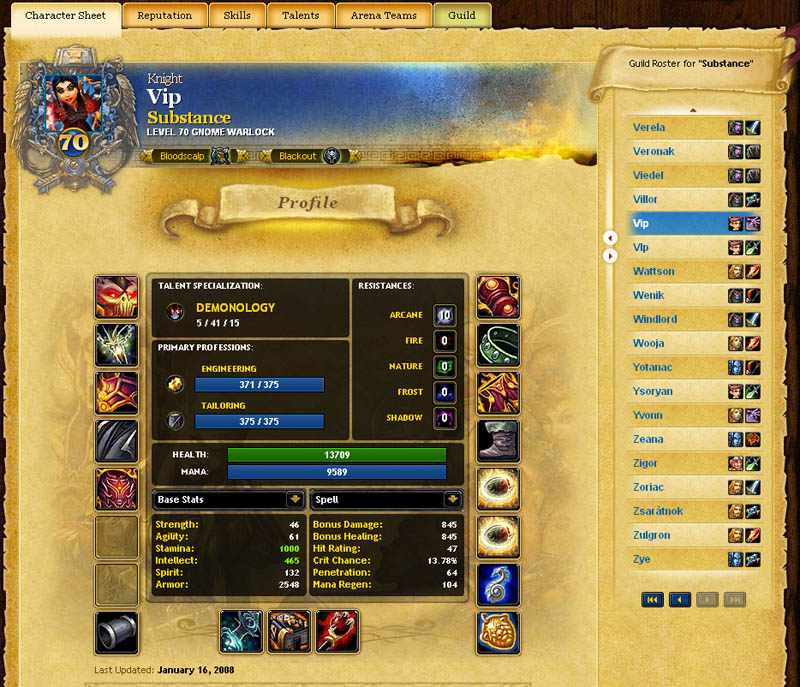Asymmetric information occurs when one party (in this case, the person or guild) knows something that the other does not, and such knowledge cannot easily transfer from one to the other. This may be because of significant distance between the two, or one does not quite believe what the other claims.
Optimal searching for an optimal amount of information
To ease this information asymmetry, one of the parties will start searching for information. Consider the scenario of a prospective guild member searching for a guild. When they gain a tidbit, they both gain a benefit (better informed decision) and incur a cost (time spent). However, as is the case with anything involving scarce resources, the marginal (extra) benefit decreases and marginal cost increases for that next tidbit as the person continues searching. The total net benefit (benefit less costs) from the search will continue growing up to the point where marginal benefit equals marginal cost. It is at this point where the prospective guild member should stop searching (lest they undo the benefit they accumulated!). As a result, depending on the individual, they might listen to friends' recommendations, but not trawl through hundreds of posts on the realm's forum.
Marginal benefit (blue) decreases and marginal cost (red) increases as quantity increases.
Recruitment officers have it difficult as well when they are trying to find the right people for the guild. They are as much subject to diminishing marginal benefit and increasing marginal cost, and they might choose not to pursue certain avenues in their search as well. The fact that both prospective members and guilds need to search indicates significant costs that asymmetric information can impose in the matchmaking process.
LF raiding guild
Fortunately, such costs can be reduced by agents, or people who make the exchange of information quicker and easier. In World of Warcraft, people use facilities that give the same effect. Both a person looking for a raiding guild and a recruitment officer may search the trade channel or the realm forums, which are much more convenient than huddling in a predetermined 50 square yard area! These middlemen make guild matchmaking much less painful.
Suspicions
Asymmetric information problems do not end there! There is often doubt between the guild and the member. The guild may wonder, how able is the player, and what is their flight risk? Similarly, how can the new guild member know how able the guild is with progression?
A screenshot of an Armory character page.
There comes a need for signals to be sent between the two, which communicate the information sought. Of course, anyone can forge a signal (anyone can talk up a progression history!), so a credibility problem arises. For the signal to be believable, it often needs to be costly to fake. At the time of recruitment/joining, the following resources, conventionally accepted as credible, may have been inspected:
- A person looking for a raiding guild may want to inspect screenshots of boss downs and the progression thread on the realm forum.
- A recruitment officer may want to check the gear and achievements of the potential recruit.
If there is a high degree of distrust between them, one or both may practice statistical discrimination, where judgements are made based on known characteristics. A guild under Trial of the Crusader progression may decide not to recruit anyone with a gear quality below Ulduar, if they believe that higher gear quality signifies higher skill. Similarly, a Death Knight may not join a guild that is already full on Death Knights, if they believe that a higher population of their class in that guild signifies a lower chance to be selected for a raid. The few rare opportunities that exist can easily be overlooked.
If a guild offered the member a core position on invitation, the guild may suffer a moral hazard. This is where the person behaves a certain way when exposed to risk, but behaves differently when protected from it. Now that the member is guaranteed to be selected for every raid, do they have an incentive to pull their weight? Most likely, the answer is 'no', and they may start slacking off without worrying about losing their slot. A guild may avoid this moral hazard completely by not offering a core position on invitation, and instead insist that they both earn it and compete with the other guild members to retain it. Under these circumstances, the member would feel compelled to pull their weight, lest they become low-priority for the purposes of populating a raid. Of course, if the person is not fine with this arrangement, they may simply just keep looking for another guild.
In conclusion
There will always be some amount of distance and distrust between guilds and prospective players, and they will need to find ways to alleviate such problems as caused by asymmetric information. The quest for truthful information continues.



Epic was here :)
ReplyDelete